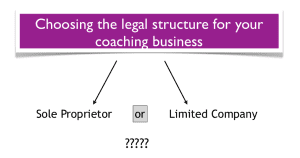Stage 4 – Starting your own coaching business – choosing a legal structure for you business
You have decide to set up your own coaching practice, you are taking your training, you have decided what services you are going to be offering, what areas of coaching or therapy you are going to be working in, and whereabouts you are going to call your business ‘territory.’ The next thing to do is to decide on a name for your coaching practice, what sort of legal structure your business is going to take and to grab your website address before someone else gets it.
In terms of legal structure for your business you generally have three options depending on which country you are in. You can operate as a limited company, you can operate as a sole trader, and you can operate as part of a partnership.
Since we are talking about you setting up your own business, then we will assume for the purpose of this article that a partnership will not be suitable for you as that would involve working in partnership with another person, or persons.
The main differences between a limited company and a sole trader are to do with the tax treatment and how liabilities are treated should your business fail.
A sole trader is responsible for the debts of the business as if they were their own debts. So, if you are a sole trader, and your business fails, then you will be responsible for the debts that you have accumulated in running your business.
A limited company operates as a separate entity in its own right and therefore has ownership of its own debts. So, if you are operating as a limited company and your business fails, then your liability is “limited” in that the business is responsible for any business debts. This is the cause of much concern for creditor victims of serial entrepreneurs, who run up business debts, let the business fail and then set up another business and start incurring debts once again.

It is probably unlikely that this will be a major consideration for you since it is very difficult for new businesses to get credit these days, and you are not going to be running a business with a vast amount of stock, so therefore you will not necessarily be needing credit.
As far as tax is concerned, a sole trader is responsible for income tax on any income that they generate above their usual individual allowance. They are also responsible for charging and paying VAT if they are registered for it. As a sole trader there are expenses that you will incur as a result of your business activities and these can usually be off-set against income before any tax becomes due. You will complete an annual tax return to report income and expenditure, just as most higher rate taxpayers are used to doing in the UK already.
A limited company is liable for Corporation Tax on any profit that is made. You will need an accountant to prepare and submit annual accounts for your business. Once the business has paid the corporation tax, then you may take an income from the company. Limited Companies are limited by the issue of shares, so for example you may set up your business with 100 shares that you own. Your business is then made up of in effect 100 segments, which you can sell to raise capital.
Most business owners take money out of their company in the form of dividends which come as income from the shares. The tax on dividends is lower in the UK, than tax on income (half at the basic rate), so this makes sense financially. The business is responsible for collecting and paying VAT if the company is registered for it.
Some benefits of setting up as a limited company are that some organisations are reluctant to contract employ sole traders as coaches, since they view it as a credibility issue. Limited companies must register accounts with Companies House, which means that it is easier to financially appraise and carry out due diligence on a limited company than it is a sole trader.
Limited companies can be sold, or part sold if they build up a value. This may not be such a benefit in the coaching arena, since you are the main asset of the company, and without you, there is no value in the business.
Most coaches set up in business as sole traders at the outset as the structure is much less complicated and also the professional fees (accountants) associated with the business are lower. You can change the legal structure later if necessary.
The next stages of building your coaching practice from scratch are going to be covered in further blogs. We will cover:
- Choosing a name for your business
- Getting your website address
- Web hosting
- Website design
- Getting an accountant, business bank account
- Company business cards, letterhead
- Finding some clients!

